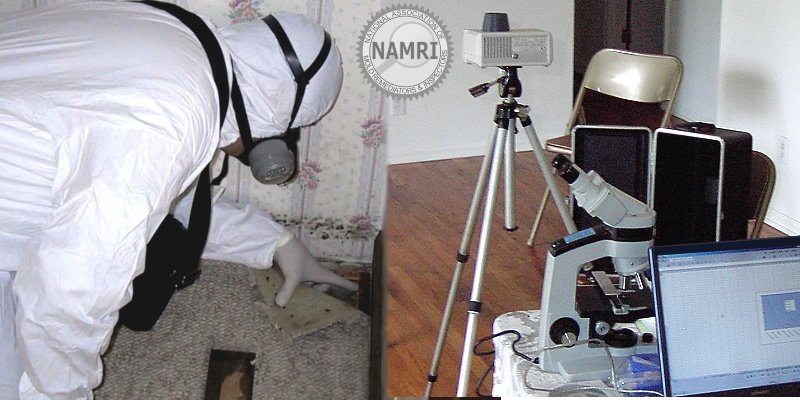Mold problems can pose serious health risks and can greatly devalue a property. Your NAMRI inspector will identify
visible areas of microbial growth, water damage, and potential problems that can affect the home. The inspector
will perform a knowledgeable mold inspection, along with client-approved mold sampling using national standards
of practice, providing vital information that you need to know. Your NAMRI inspector will always put your interests
first, treating each inspection with honesty, integrity, and complete confidentiality.
What is Mold?
Molds are fungi of more than 100,000 species that break down organic materials in nature such as dead plants and
wood. They reproduce through microscopic spores that are spread through the air. In order to grow, mold requires
a source of food, moisture, and a suitable temperature. Mold can grow on any surface that is organic or has household
dust or soil particles.
Mold is identified through surface and air sampling which is sent to a mycology laboratory for testing. However,
mold identification does not provide information about the possible exposure to mold, or the risk of health effects
from mold. A certified industrial hygienist (CIH) or a certified residential mold inspector (CRMI) is qualified
to inspect a home for the presence of visible mold, and to collect samples for mold.
How Does Mold Affect My Home?
Mold inside homes has always existed, but building flaws and cheap construction materials have amplified the problem
in recent years. There is a lot of misinformation about mold in the building industry. There are those who minimize
the problem, and those who exaggerate it.
No one disputes the fact that certain molds can be harmful to some people. There is evidence of permanent neurological,
pathological, immunological, and psychological damage that exposure to certain mycotoxin producing fungi causes.
However, the affects of most molds is largely unknown. People's reaction to mold differs based on individual immune
systems and exposure.
Despite much research and scientific findings, the Center for Disease control (CDC) claims that at present there
is no test that proves an association between the toxic black mold Stachybotrys chartarum and particular health
symptoms. As a result, the government has not set any standards or exposure limits for indoor air quality.
The insurance industry has reacted to mold in homes by canceling policies or refusing to issue policies that include
mold due to a growing number of lawsuits. Insurance companies have paid out billions of dollars in mold claims
each year. For the sake of your property value alone, it is important to understand how mold can affect your financial
future.
Below are some excellent resources for consumers:
Mold Center for Environmental Health - General information
from the Centers for Disease Control and Prevention.
EPA Mold Resources - The Environmental Protection Agency
mold information.
Mold Help.org - A lot of information about mold and the
potential problems caused.
Indoor Air Quality Association - Provides a national forum for
the development of standards for the assessment of indoor environments




